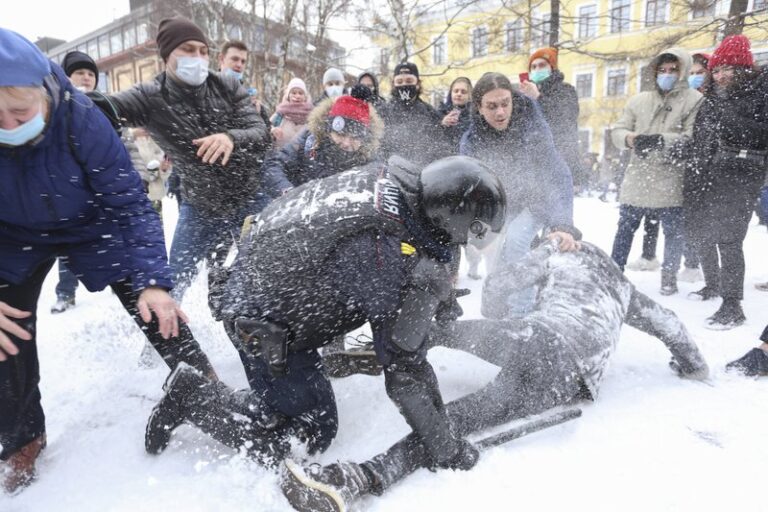
(AP) — Chanting slogans against President Vladimir Putin, tens of thousands took to the streets Sunday across Russia to demand the release of jailed opposition leader Alexei Navalny, keeping up nationwide protests that have rattled the Kremlin. More than 5,100 people were detained by police, according to a monitoring group, and some were beaten.
The massive protests came despite efforts by Russian authorities to stem the tide of demonstrations after tens of thousands rallied across the country last weekend in the largest, most widespread show of discontent that Russia had seen in years. Despite threats of jail terms, warnings to social media groups and tight police cordons, the protests again engulfed cities across Russia’s 11 time zones on Sunday.
Navalny’s team quickly called another protest in Moscow for Tuesday, when he is set to face a court hearing that could send him to prison for years.
The 44-year-old Navalny, an anti-corruption investigator who is Putin’s best-known critic, was arrested on Jan. 17 upon returning from Germany, where he spent five months recovering from nerve-agent poisoning that he blames on the Kremlin. Russian authorities have rejected the accusations. He was arrested for allegedly violating his parole conditions by not reporting for meetings with law enforcement when he was recuperating in Germany.
The United States urged Russia to release Navalny and criticized the crackdown on protests.
“The U.S. condemns the persistent use of harsh tactics against peaceful protesters and journalists by Russian authorities for a second week straight,” U.S. Secretary of State Antony Blinken said on Twitter.
The Russian Foreign Ministry rejected Blinken’s call as “crude interference in Russia’s internal affairs” and accused Washington of trying to destabilize the situation in the country by backing the protests.
On Sunday, police detained more than 5,100 people in cities nationwide, according to OVD-Info, a group that monitors political arrests, surpassing some 4,000 detentions at the demonstrations across Russia on Jan. 23.
In Moscow, authorities introduced unprecedented security measures in the city center, closing subway stations near the Kremlin, cutting bus traffic and ordering restaurants and stores to stay closed.
Navalny’s team initially called for Sunday’s protest to be held on Moscow’s Lubyanka Square, home to the main headquarters of the Federal Security Service, which Navalny contends was responsible for his poisoning. Facing police cordons around the square, the protest shifted to other central squares and streets.






